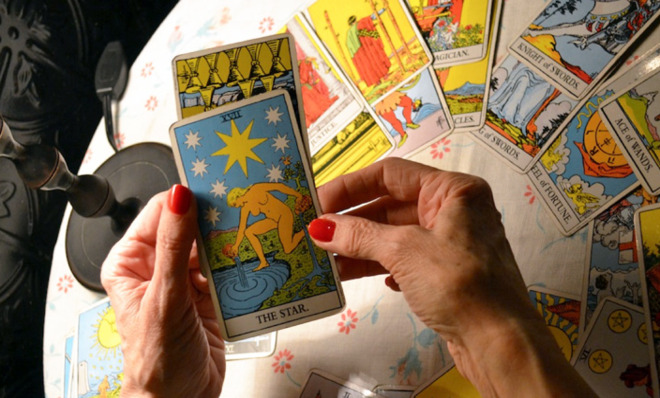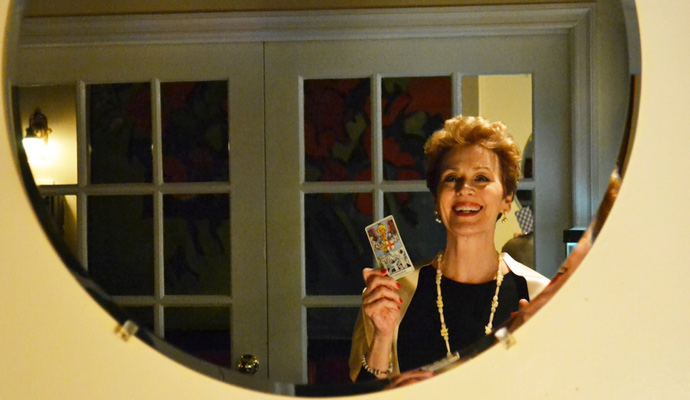The unlikely psychic
A writer turned PR director turned stockbroker finds her calling among a deck of tarot cards

A free daily email with the biggest news stories of the day – and the best features from TheWeek.com
You are now subscribed
Your newsletter sign-up was successful

There is no wall of beads. No headscarf. And absolutely no crystal ball. Just a set of stairs inside a boho-chic bistro spiraling up to a tiny alcove near the bathroom. Tucked in the corner is a woman, sitting, hands folded on a floral tablecloth, cards stacked and ready. The din of loud music and a packed house floats up from below. In spite of the noise and the constant traffic of diners, her table feels intimate.
The woman's high cheekbones belie her 62 years. Her face feels familiar — a slender oval with deep-set brown eyes and cropped golden blonde hair, sort of Susan Sarandon meets Angela Lansbury. Her manicure, vintage rose-shaped earrings and the shirt beneath her open blue button-down are a perfectly matched powder pink.
Janet Horton tells me her story on a recent Friday evening at the crowded Raoul's Restaurant, which has hosted psychics on Prince Street in SoHo for the past 24 years. Horton has been reading tarot cards professionally for some 15 years, and at Raoul's for the past three. Speaking in an animated, nonlinear narrative, stopping here and there to chat with an inquisitive passersby or to cater to a customer, Horton explains that she tapped into the "other side" long before she knew what it meant to be psychic.
The Week
Escape your echo chamber. Get the facts behind the news, plus analysis from multiple perspectives.

Sign up for The Week's Free Newsletters
From our morning news briefing to a weekly Good News Newsletter, get the best of The Week delivered directly to your inbox.
From our morning news briefing to a weekly Good News Newsletter, get the best of The Week delivered directly to your inbox.
(More from Narratively: The secret mikvah society)
"I'm five years old, and my mother takes me to go meet the woman who moved in down the street," says Horton, who grew up in a quiet, lakeside Ohio suburb. "We're sitting on the couch, and beyond this lady's head," she motions past me, "is a hall, and down the hall, there are bedrooms, and in that bedroom to the left, there's an old German man who died there. He says to me, 'Tell these filthy squatters to get out of my house.'"
The young Horton relayed the message from the deceased old man, and her mother bade the new neighbor a hasty goodbye.
Ever since, Horton hasn't been afraid of ghosts. She says the unsettled — be they the wandering dead or the hostile living — bring out her maternal instincts. "To me, something evil and spooky is, you poor thing," Horton explains. "I look for cause of pain or anger."
A free daily email with the biggest news stories of the day – and the best features from TheWeek.com
Years later, Horton would find herself walking alone in the dark when a young man approached her with apparently negative intentions. "He hadn't resolved to give me a hard time," she recalls thinking. "Once he was near, I said, 'I'm a psychic. Your mother is gone, but she wants you to know she's so proud of you. I've got another five blocks to go — want to walk me?'" And so he escorted her safely to her destination.
Horton says she could tell he was "a really good man" and was able to see through the rough exterior of this would-be mugger by being "a motherly presence." She expects that if she had acted afraid and "engaged in the negative energy," she may have brought out the worst in him.
(More from Narratively: Vinyl voyagers)
Other times, she and the spirits might even share a laugh. Horton launches, unprovoked, into a tale about "the spookiest thing that ever happened here."
"So, I'm sitting here giving a reading and a man comes and sits nearby," she tells me. "He's talking so loudly he's keeping me from giving a good reading. After the reading, I start to get ready to leave, and the phone on the wall behind him rings. There is no connection. It's an antique. He looks at me and says, 'The phone's ringing!' I said, 'I know. Answer it.' So, he picks up the phone."
"'There's nobody there!' he says, hanging up. 'It just sounded like whoooeewhew. What do you think happened?' I answer, 'Well, this is a really spiritual place and you were talking loudly before. I'm really sorry but I was wishing that your energy would quiet down, so I think God and the spirits phoned.'
"And he just tears out of the restaurant. I think, 'Oh, gee, I shouldn't have told him, poor fellow.' I finish up, go home, go to bed, and in the morning I wake up to the phone ringing. The machine usually picks up after four rings, but it keeps ringing. When I pick it up I hear a voice say, 'It's whooeewheew! And I didn't even charge you for the call.'"

We jump back about 50 years, as I try not to stare at the antique payphone 10 feet away. Horton tells me how she moved from Ohio to New Jersey with her parents and three brothers, and that her childhood was increasingly filled with floating Ouija boards, psychic dreams and premonitions. At 14, she awoke one morning, convinced from her dreams that her mother would get in a car accident that day. She warned her parents and told her mother, 'I'm not getting in the car with you.' Horton recalls her relief after her mother got in a harmless collision leaving the parking lot: "I was glad to get it out of the way!"
She did the occasional card reading for fun, using playing cards as instructed by her book on Gypsy-style tarot card readings, but she had never considered "going pro." After high school, Horton set off to Swarthmore College, with dreams of becoming a novelist and journalist in New York. Eager to start her career, she dropped out of school in 1974, after two years, and headed to the big city. "What a young idiot," she says, smiling.
No one in New York seemed to think so. Horton hopped right over the internship pond to a job in radio at NBC and got her journalist feet wet as a freelancer. She'd written just half a dozen articles — mostly publisher profiles — when the publisher of American Home, taken by Horton's style, offered her a job as senior editor.
"I was 26, and I was confident, but I was sure that she would discover that I didn't have the experience for the job and fire me," remembers Horton, who ended up leaving American Home of her own volition after about year. She scored an interview with Us Weekly, at the time a new bi-monthly outlet for "classy little profiles" owned by the New York Times. After learning that she had merely been granted a "courtesy interview," she shifted into high gear and stayed up all night to finish the managing editor's questionnaire, leaving her responses on his chair at 8:30 the next morning. Horton does her own version of "brushing her shoulders off" as she recalls knowing she'd just won herself the gig: hands curled, she brings her pink fingernails toward her mouth, gives each set of fingers a blow and brushes her fists on the front of each shoulder.
Just a few years later, feeling too green for her own shoes — "I wasn't as fast, didn't have the contacts that the other editors had" — and worried that she'd never find the time, money and energy to pursue her own writing if she stayed an editor, she accepted a high-salaried position as PR director of the New York State Olympic Committee in 1979, as the country prepared for the Lake Placid games. Contacts Horton made though committee fundraisers later set her up with several interviews on Wall Street, and soon enough, the college dropout-turned-editor-turned-publicist was a stockbroker. "I always got the job; always breezed through," recalls Horton.
(More from Narratively: New York's most omnipresent structure)
As her resume grew, Horton's literary aspirations stayed top of mind, while her spiritual powers lay quiet in the back. "I knew I was psychic, but when you're in the corporate world, you don't go around telling people that," she says. "They'll think you're a kook."
Learning on the fly, Horton did not, she insists, use her psychic abilities to predict the markets. "I was an in-depth student. I studied my firms' research and the newspapers. God and the spirits do not care about making people rich. Abundance is great, security is great, but greed is not a positive state of mind." She spent seven years as a broker, and had soon accumulated the badges of big city success: a husband, a Manhattan apartment, a Connecticut house, and a yacht.
All the while, though, Horton longed for nothing more than a private garret and the time to write. She left Wall Street shortly after the stock market crash of '87. She and her husband divorced soon after. With enough savings on hand to finally focus on her writing, Horton moved from Manhattan to Hoboken in 1990, finally realizing the independent, lower-rent lifestyle she had long craved.
Read the rest of the story at Narratively.
Narratively is an online magazine devoted to original, in-depth and untold stories. Each week, Narratively explores a different theme and publishes just one story a day. It was one of TIME's 50 Best Websites of 2013.
-
 The Week Unwrapped: Do the Freemasons have too much sway in the police force?
The Week Unwrapped: Do the Freemasons have too much sway in the police force?Podcast Plus, what does the growing popularity of prediction markets mean for the future? And why are UK film and TV workers struggling?
-
 Properties of the week: pretty thatched cottages
Properties of the week: pretty thatched cottagesThe Week Recommends Featuring homes in West Sussex, Dorset and Suffolk
-
 The week’s best photos
The week’s best photosIn Pictures An explosive meal, a carnival of joy, and more